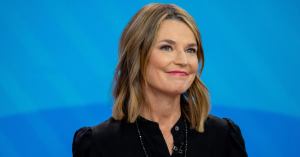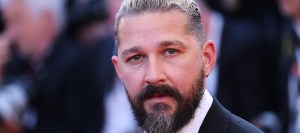In the short film The Escape, director Paul J. Franklin weaves a modern telling of late sci-fi author Robert Sheckley’s story about a man seeking more meaning in his life, via some extreme (and costly) ways. That man, Lambert (played by actor Julian Sands), is presented with a Faustian bargain: Live out his most tantalizing fantasy, in exchange for handing over every one of his possessions to the enigmatic Kellan (Art Malik), who can supposedly deliver anyone’s desire.
The Lambert decides to take this devil’s deal, sacrificing much in the process. Of course, like most Faustian transactions, Lambert doesn’t get quite what he wanted from the deal, leading to a shocking revelation about that which was truly surrendered, and truly gained.
Videos by PopCulture.com
Fans may recognize the name of The Escape director, Paul Franklin: He’s the multi-Oscar-winning Visual Effects Supervisor of Christopher Nolan’s Inception and Interstellar, who also worked on a number of other Nolan films, including The Dark Knight, The Dark Knight Rises. He’s also worked on major franchises blockbusters like Marvel’s Captain America: Civil War and Warner Bros.’ Harry Potter and the Half-Blood Prince.
Read on for our impressions of The Escape, as well as an interview with Paul Franklin!
‘The Escape’: Interview with Director Paul Frankin

One thing that The Escape does so masterfully is building a slow-burn arc (relative to this short film), which starts off with a tantalizing mystery, segues into a much more grounded and emotional character drama, and then ends things with a big, epic, sci-fi themed reveal. Even though he is a major talent with visual effects, Franklin is also remarkably restrained, using VFX aids to simply augment most of the shots, and saving the massive effects moments for a well-earned ending.
In speaking with the director, we talked about going from a wildly successful visual effects background to directing a film that had much more intimate character moments.
According to Franklin, it wasn’t that big of a stretch, as, “For me that’s always been one of the most interesting things to do with visual effects is to be able to use the power of modern visual effects to be able to connect the very small and intimate to the very large-scale. I think that’s always been a very interesting thing. In terms of the technical approach, I’m always very much a fan of doing only what is absolutely necessary. I’m not a big fan of embellishing things for their own sake. It’s very easy to get carried away and start showing off with technology and I’m very aware of how to go about doing that. I suppose also there’s a sense of I didn’t really want to make a film that was just showing off the fact that I can do visual effects because I think I’ve probably done that in other films that I’ve worked on over the years.”
Franklin also had a lot of praise for the late Robert Sheckley as an inspiration for the type of sci-fi stories he likes to tell, saying, “it would be great if perhaps, if my film does find any success, that it perhaps leads people to the work of Robert Sheckley, who really was a truly original voice in science fiction and I think deserves more exposure. He’s not quite as well known these days as he was at the height of his success. That would be one nice thing to come out of this film.” He also added that “He was extraordinary.”
Paul Franklin’s Next Move

As for his own career? Franklin has already reached the heights of his lane in the industry (two Oscars, and counting…), so naturally, his next move is to shift lanes, and do more directing!
First off, Franklin sees room for the story of The Escape to be stretched out into a full-length feature, stating:
“I think looking further forward for The Escape, one of the things that we’ve been asking ourselves is is there a longer, bigger version of this film? Is there an opportunity here to explore the world that we created with the film? To find out more about Lambert’s situation. What he’s going to do after the film has ended and what led to the situation that he finds himself in in the first place. I think that’s a fascinating idea. I’m very keen to explore that if at all possible… I think looking further forward for The Escape, one of the things that we’ve been asking ourselves is is there a longer, bigger version of this film? Is there an opportunity here to explore the world that we created with the film? To find out more about Lambert’s situation… I think that then opens up a whole realm of possibilities to explore the ramifications of all of that. Also just to explore the mechanics of the universe that we created in the film.”
After this project, however, Franklin has is eye on other potential sci-fi and superhero projects, as he revealed during our interview:
“…where to begin? There are so many fantastic science fiction stories, novels, short stories, comic books, graphic novels, which have never made it to the screen for one reason or another. I’m a very big fan of the work of Iain M. Banks, the Scottish science fiction writer. He also wrote a lot of non-science fiction as well but he wrote the series of novels about a Utopian galactic civilization called The Culture.
There’s a comic book that I grew up with. It’s written by Alan Moore who’s the writer who created Watchmen. Called The Ballad of Halo Jones, which I think is a really fantastic piece of far-future speculation but it also has a very, very strong central feminist theme to it as well and which marks it out to being quite unusual for a comic book written in the early 1980s that was sold primarily to teenage boys at the time.
I think that would be absolutely fantastic, but there are so many different things that one could get into. I’m also interested in writing my own stuff as well. One of the things I enjoyed most about making The Escape was actually writing the script, adapting the original short story and turning it into my own thing. That’s something I’m also keen to pursue as well. My own ideas.”
The Escape was recently shown at the Tribeca Film Festival, and is considering other distribution options.








